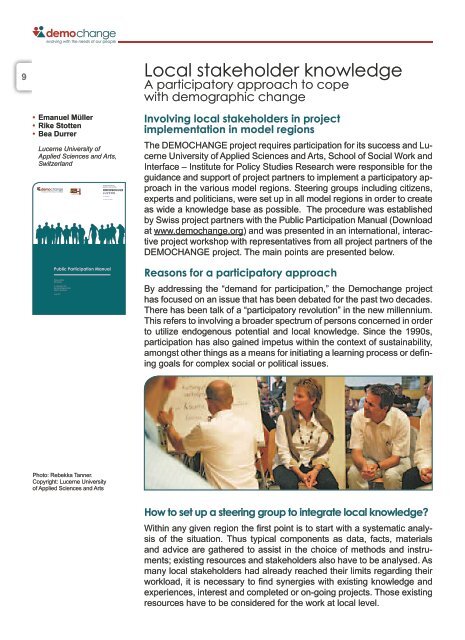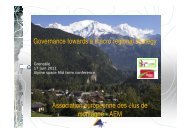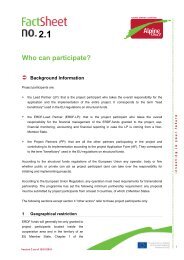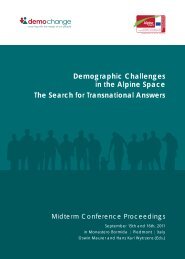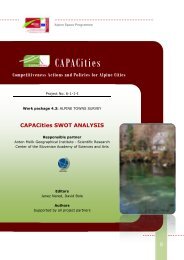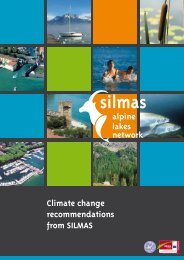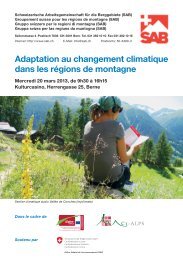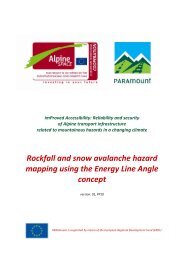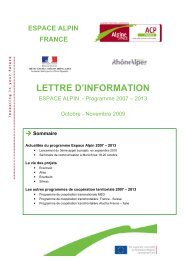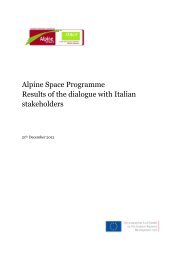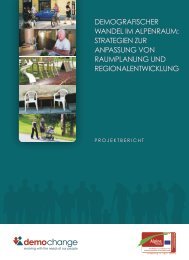aDaptation strategies to spatial planning anD regional Development
aDaptation strategies to spatial planning anD regional Development
aDaptation strategies to spatial planning anD regional Development
You also want an ePaper? Increase the reach of your titles
YUMPU automatically turns print PDFs into web optimized ePapers that Google loves.
9 Local stakeholder knowledge<br />
A participa<strong>to</strong>ry approach <strong>to</strong> cope<br />
with demographic change<br />
• Emanuel Müller<br />
• Rike S<strong>to</strong>tten<br />
• Bea Durrer<br />
Lucerne University of<br />
Applied Sciences and Arts,<br />
Switzerland<br />
Public Participation Manual<br />
Emanuel Müller<br />
Rike S<strong>to</strong>tten<br />
In cooperation with:<br />
Bea Durrer Eggerschwiler<br />
Heidrun Wankiewicz<br />
June 2011<br />
Involving local stakeholders in project<br />
implementation in model regions<br />
The DEMOCHANGE project requires participation for its success and Lucerne<br />
University of Applied Sciences and Arts, School of Social Work and<br />
Interface – Institute for Policy Studies Research were responsible for the<br />
guidance and support of project partners <strong>to</strong> implement a participa<strong>to</strong>ry approach<br />
in the various model regions. Steering groups including citizens,<br />
experts and politicians, were set up in all model regions in order <strong>to</strong> create<br />
as wide a knowledge base as possible. The procedure was established<br />
by Swiss project partners with the Public Participation Manual (Download<br />
at www.demochange.org) and was presented in an international, interactive<br />
project workshop with representatives from all project partners of the<br />
DEMOCHANGE project. The main points are presented below.<br />
Reasons for a participa<strong>to</strong>ry approach<br />
By addressing the “demand for participation,” the Demochange project<br />
has focused on an issue that has been debated for the past two decades.<br />
There has been talk of a “participa<strong>to</strong>ry revolution” in the new millennium.<br />
This refers <strong>to</strong> involving a broader spectrum of persons concerned in order<br />
<strong>to</strong> utilize endogenous potential and local knowledge. Since the 1990s,<br />
participation has also gained impetus within the context of sustainability,<br />
amongst other things as a means for initiating a learning process or defining<br />
goals for complex social or political issues.<br />
Pho<strong>to</strong>: Rebekka Tanner.<br />
Copyright: Lucerne University<br />
of Applied Sciences and Arts<br />
How <strong>to</strong> set up a steering group <strong>to</strong> integrate local knowledge?<br />
Within any given region the first point is <strong>to</strong> start with a systematic analysis<br />
of the situation. Thus typical components as data, facts, materials<br />
and advice are gathered <strong>to</strong> assist in the choice of methods and instruments;<br />
existing resources and stakeholders also have <strong>to</strong> be analysed. As<br />
many local stakeholders had already reached their limits regarding their<br />
workload, it is necessary <strong>to</strong> find synergies with existing knowledge and<br />
experiences, interest and completed or on-going projects. Those existing<br />
resources have <strong>to</strong> be considered for the work at local level.


